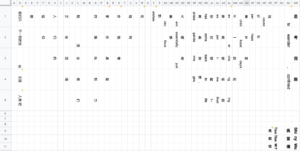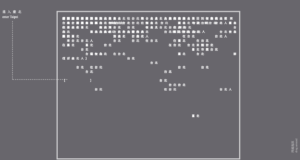New Media Art Worker
新媒体艺术家
—the 99 percent artistic ones excluding the 1 percent artist
那些百分之 99 的, 不包括百分之一
Shiny Shuan-Yi Wu
—and her thoughts written after watching the documentary The Verse of Us (2017) during the outbreak of Coronavirus in early 2020
-她在 2020 年在冠状病毒爆发期间看完纪录片《The Verse of Us》纪录片后的感想
I am not a worker.
我不是工作者。
I am not a tool.
我不是工具。
But to work you got to have tools
但要工作就要有工具
And to have tools you got to work
然后要有工具就要工作
What
什么
is the meaning of making art
是制作艺术的意义
What is the meaning of making
制作的意义是什么
Art
艺术
Work
工作
What is that
这是啥
People
人
look at your tools based on your works
从作品的角度来看工具
look at your works
看你的作品
regardless of tools
不管工具
There is no you.
那里没有你
Is there
有没有
a meaning
意义
when art means no more than
当艺术的意义不外于
I am a tool.
我是个工具。
I am a worker.
我是个工人。
And to prove meaning requires extra effort
而证明意义需要额外气力
so
那么
Extra
额外
work for proving myself to society
向社会证明自己
and to the world
也向世界
Sorry,
不好意思,
not myself, I mean
我的意思是,不证明自己,证明
art
艺术
As if art is to be assigned
就像艺术是要分配的
work to be meaningful
努力让它有意义
As if art itself means
就像艺术本来的意思就是
Nothing
没什么
as a work
作为一个艺术
of art
作品
I can say that
我可以这样说
It’s like standing at a podium
想站在讲台上
talking passion with your yearning eyes
用眷眷的眼睛讲激情
next to a beautifully made
旁边有精美的
powerpoint showcase
ppt
And you notice what is
你发现什么在
in front of you—your general
你面前 — 你的普通
audience is seemingly limited
观众看起来有点有限
They are your world.
他们是你的世界。
And the world hires you
而世界雇佣了你
Before you can even open your mouth
甚至在你所能张开嘴巴之前
and talk through the
对着话筒讲
microphone
about the real world
现实世界的事儿
It is fortunate
有点幸运
yet unfortunate
但也不幸
And soon you take only the former
你很快只选择前者
As you start to rethink
当你开始从新思考
what has gone
出了什么
Wrong
问题
you’re gulping down
你在吞下
the fact that it is
这个事实:
not about how you see the world
我怎么了解世界不重要
But how the world sees you
世界怎么了解你才重要
secretly gulping in the time of the blinking
眨眼的时间偷偷的吞,
eyes cannot leave the beautifully made
眼睛不能离开精美的东西
for those who stay
给留下的人看
I am grateful.
我很感激
For not being a traditional worker
没有当传统的工作者
nowhere near the microphone
离话筒
And the podium
讲台
And the powerpoint
Ppt
一点都不近
I am grateful
我很感激
for being able
可以
to work
工作
for what I have given
为了别人给我的东西
by my parents
父母给我的
And the other workers
别的工作者给我的
If fortunate
如果运气
enough, as a tool
足够,作为工具
We can dig art up until we find
我们可以挖出艺术直到找到了
the buried concept
一个埋藏的概念
deep or not
是否深刻
It is a rough jade that if refined
像粗玉如果被精制
And found.
而找到了。
Has the chance to become the 1 percent
就有机会成为百分之一
And to be fortunate requires extra work
然后如果幸运也需要更加努力
But do people
但是人是在
look at you
看你
or look at your works
还是你的作品
And is that art
然后那是艺术吗
if not a tool
如果不是个工具
What are you
那你到底是什么
?


